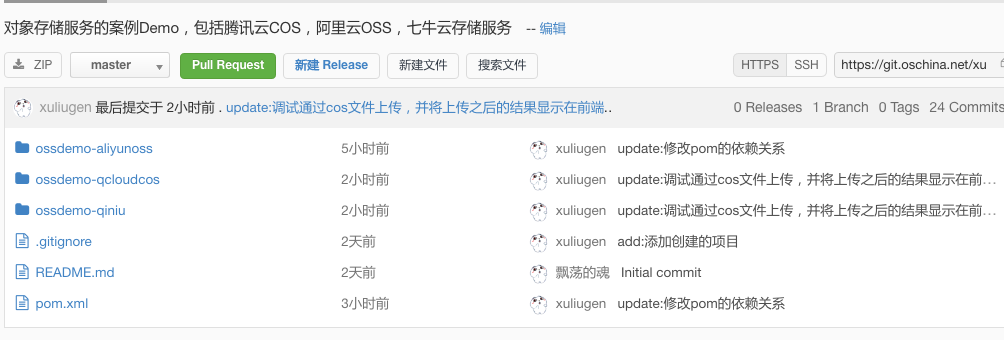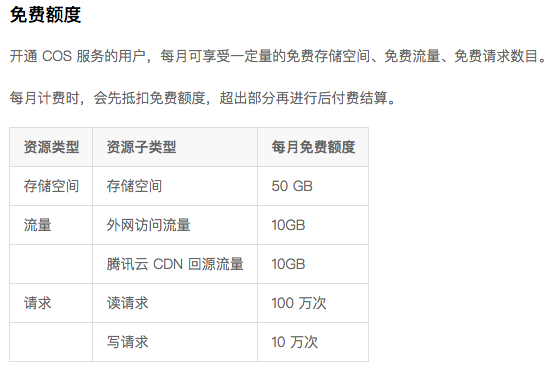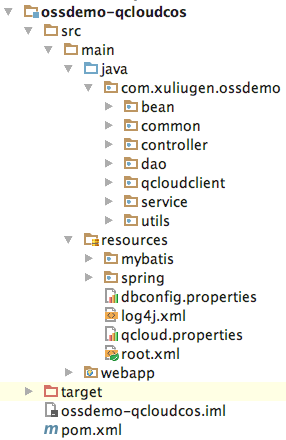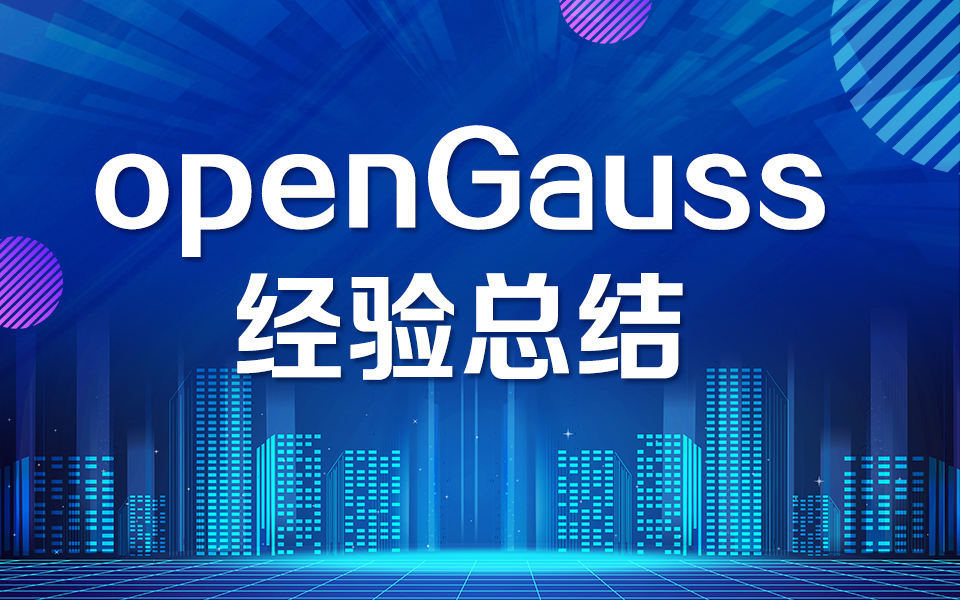首先放出GitOS的项目地址:https://git.oschina.net/xuliugen/oss-demo.git

项目目录结构:
- ossdemo-aliyunoss:阿里OSS使用案例(尚未完成)
- ossdemo-qcloudcos :腾讯云COS使用案例
- ossdemo-qiniu :七牛云存储使用案例 pom.xml
腾讯云COS
1、官方的使用API介绍地址:https://www.qcloud.com/doc/product/227/Java%20SDK
2、免费额度

相比目前市场上主流的云存储平台,这个配置对于一般的小型互联网公司来说还是比较有人的地方。
3、项目介绍

使用的是:SpringMVC、MyBatis 代码较为简单,主要对CosCloud的一层简单的封装,加载配置信息等操作。下边是QcloudClient的部分代码:
package com.xuliugen.ossdemo.qcloudclient;
import com.qcloud.cosapi.api.CosCloud;
import com.qcloud.cosapi.sign.Sign;
import com.xuliugen.ossdemo.common.constant.QcloudConst;
import org.slf4j.Logger;
import org.slf4j.LoggerFactory;
import java.io.File;
import java.io.IOException;
import java.util.Properties;
/**
* 自己定义的七牛文件上传Client
* Created by xuliugen on 16/5/22.
*/
public class QcloudClient {
private static Properties props = new Properties();
private static Logger log = LoggerFactory.getLogger(QcloudClient.class);
static {
try {
props.load(QcloudClient.class.getResourceAsStream("/qcloud.properties"));
} catch (IOException e) {
log.error("加载配置文件失败", e);
}
}
static int APP_ID = Integer.parseInt(props.getProperty("APP_ID"));
static String SECRET_ID = props.getProperty("SECRET_ID");
static String SECRET_KEY = props.getProperty("SECRET_KEY");
static String bucketName = props.getProperty("bucketName");
/**
* 自动判断文件的大小,已使用是否是分片的方式上传文件
* @param remoteFolderPath 远程文件夹的名称
* @param loaclPath 文件的本地路径
* @return
*/
public static String uploadFile(String remoteFolderPath, String loaclPath) {
File f = new File(loaclPath);
String result = null;
if (f.exists() && f.isFile()) {
long size = f.length();
if (size <= 8 * 1024 * 1024) {
result = cosUploadFile(remoteFolderPath + getFileName(loaclPath), loaclPath);
} else {
result = sliceUploadFileParallel(remoteFolderPath + getFileName(loaclPath), loaclPath);
}
} else {
System.out.println("file doesn't exist or is not a file");
}
return result;
}
/**
* 上传一个长度为10个字节的文件
* @param remotePath
* @param loaclPath
* @return
*/
public static String cosUploadFile(String remotePath, String loaclPath) {
CosCloud cos = new CosCloud(APP_ID, SECRET_ID, SECRET_KEY, 60);
String result = null;
try {
result = cos.uploadFile(bucketName, remotePath, loaclPath);
} catch (Exception e) {
e.printStackTrace();
}
System.out.println("uploadFile result:" + result);
return result;
}
/**
* 串行分片上传文件, 使用默认分片大小
* @param remotePath
* @param localPath
* @return
*/
public static String sliceUploadFile(String remotePath, String localPath) {
CosCloud cos = new CosCloud(APP_ID, SECRET_ID, SECRET_KEY, 60);
String result = null;
try {
result = cos.sliceUploadFile(bucketName, remotePath, localPath);
cos.shutdown();
} catch (Exception e) {
e.printStackTrace();
}
System.out.println("sliceUploadFile result: " + result);
return result;
}
/**
* 串行分片上传文件, 使用分片大小512KB
* @param remotePath
* @param localPath
* @return
*/
public static String sliceUploadFileParallel(String remotePath, String localPath) {
CosCloud cos = new CosCloud(APP_ID, SECRET_ID, SECRET_KEY, 60);
String result = null;
try {
result = cos.sliceUploadFileParallel(bucketName, remotePath, localPath, 512 * 1024);
cos.shutdown();
} catch (Exception e) {
e.printStackTrace();
}
System.out.println("para sliceUploadFile result: " + result);
return result;
}
- 1
- 2
- 3
- 4
- 5
- 6
- 7
- 8
- 9
- 10
- 11
- 12
- 13
- 14
- 15
- 16
- 17
- 18
- 19
- 20
- 21
- 22
- 23
- 24
- 25
- 26
- 27
- 28
- 29
- 30
- 31
- 32
- 33
- 34
- 35
- 36
- 37
- 38
- 39
- 40
- 41
- 42
- 43
- 44
- 45
- 46
- 47
- 48
- 49
- 50
- 51
- 52
- 53
- 54
- 55
- 56
- 57
- 58
- 59
- 60
- 61
- 62
- 63
- 64
- 65
- 66
- 67
- 68
- 69
- 70
- 71
- 72
- 73
- 74
- 75
- 76
- 77
- 78
- 79
- 80
- 81
- 82
- 83
- 84
- 85
- 86
- 87
- 88
- 89
- 90
- 91
- 92
- 93
- 94
- 95
- 96
- 97
- 98
- 99
- 100
- 101
- 102
- 103
- 104
- 105
- 106
- 107
- 108
- 109
- 110
- 111
- 112
- 113
- 114
- 115
- 116
- 117
- 118
- 1
- 2
- 3
- 4
- 5
- 6
- 7
- 8
- 9
- 10
- 11
- 12
- 13
- 14
- 15
- 16
- 17
- 18
- 19
- 20
- 21
- 22
- 23
- 24
- 25
- 26
- 27
- 28
- 29
- 30
- 31
- 32
- 33
- 34
- 35
- 36
- 37
- 38
- 39
- 40
- 41
- 42
- 43
- 44
- 45
- 46
- 47
- 48
- 49
- 50
- 51
- 52
- 53
- 54
- 55
- 56
- 57
- 58
- 59
- 60
- 61
- 62
- 63
- 64
- 65
- 66
- 67
- 68
- 69
- 70
- 71
- 72
- 73
- 74
- 75
- 76
- 77
- 78
- 79
- 80
- 81
- 82
- 83
- 84
- 85
- 86
- 87
- 88
- 89
- 90
- 91
- 92
- 93
- 94
- 95
- 96
- 97
- 98
- 99
- 100
- 101
- 102
- 103
- 104
- 105
- 106
- 107
- 108
- 109
- 110
- 111
- 112
- 113
- 114
- 115
- 116
- 117
- 118
该Module可以进行单独的部署,和另外两个Module完全独立,便于单独抽出进行使用。
详细代码请到项目中查看。
要修改resources下的qcloud.properties为自己账户下的信息:
APP_ID=
SECRET_ID=
SECRET_KEY=
bucketName=
七牛云存储
1、官方的使用API介绍地址:http://developer.qiniu.com/code/v7/sdk/java.html
2、免费额度

这里相对于腾讯的COS空间明显少了很多。
3、项目结构
这个和腾讯云COS的项目结构一样的,不多做解释,使用到的是:
package com.xuliugen.ossdemo.qcloudclient;
import com.qiniu.storage.BucketManager;
import com.qiniu.storage.UploadManager;
import com.qiniu.util.Auth;
import org.slf4j.Logger;
import org.slf4j.LoggerFactory;
import java.io.IOException;
import java.util.Properties;
/**
* 自己定义的七牛文件上传Client
* Created by xuliugen on 16/5/22.
*/
public class QiniuClient {
private static Properties props = new Properties();
private static Logger log = LoggerFactory.getLogger(QiniuClient.class);
static {
try {
props.load(QiniuClient.class.getResourceAsStream("/qiniu.properties"));
} catch (IOException e) {
log.error("加载配置文件失败", e);
}
}
static String accessKey = props.getProperty("accessKey");
static String secretKey = props.getProperty("secretKey");
static String bucket = props.getProperty("bucket");
static Auth auth = Auth.create(accessKey, secretKey);
/**
* 上传文件到七牛服务器(断点上传)
* @param key 文件名
* @param data 文件内容 byte[]
* @throws Exception
*/
public static void uploadFile(byte[] data, String key) throws Exception {
String token = auth.uploadToken(bucket, key);
UploadManager uploadManager = new UploadManager();
uploadManager.put(data, key, token);
}
/**
* 从七牛服务器下载文件(获取下载地址)
* @param key 文件名
* @throws Exception
*/
public static String downloadFile(String key) throws Exception {
return auth.privateDownloadUrl(key, 3600 * 24);
}
/**
* 从七牛服务器删除文件
* @param key 文件名
*/
public static void delFile(String key) throws Exception {
BucketManager bucketManager = new BucketManager(auth);
bucketManager.delete(bucket, key);
}
}
- 1
- 2
- 3
- 4
- 5
- 6
- 7
- 8
- 9
- 10
- 11
- 12
- 13
- 14
- 15
- 16
- 17
- 18
- 19
- 20
- 21
- 22
- 23
- 24
- 25
- 26
- 27
- 28
- 29
- 30
- 31
- 32
- 33
- 34
- 35
- 36
- 37
- 38
- 39
- 40
- 41
- 42
- 43
- 44
- 45
- 46
- 47
- 48
- 49
- 50
- 51
- 52
- 53
- 54
- 55
- 56
- 57
- 58
- 59
- 60
- 61
- 62
- 63
- 64
- 65
- 66
- 1
- 2
- 3
- 4
- 5
- 6
- 7
- 8
- 9
- 10
- 11
- 12
- 13
- 14
- 15
- 16
- 17
- 18
- 19
- 20
- 21
- 22
- 23
- 24
- 25
- 26
- 27
- 28
- 29
- 30
- 31
- 32
- 33
- 34
- 35
- 36
- 37
- 38
- 39
- 40
- 41
- 42
- 43
- 44
- 45
- 46
- 47
- 48
- 49
- 50
- 51
- 52
- 53
- 54
- 55
- 56
- 57
- 58
- 59
- 60
- 61
- 62
- 63
- 64
- 65
- 66
要修改resources下的qiniu.properties为自己账户下的信息:
accessKey=
secretKey=
bucket=
APP_ID=
SECRET_ID=
SECRET_KEY=
bucketName=
各平台的比较
1、免费额度的对比
这个刚才上述都已经做了对比,另外阿里云的OSS是没有提供免费额度的,这个免费的服务在2015年的时候据说都已经停止了。
2、API对比
(1)腾讯云COS的上传文件的API有一个很纠结的地方,如下:
/**
* 单个文件上传,适用于小文件
* @param bucketName bucket名称
* @param remotePath 远程文件路径
* @param localPath 本地文件路径
* @return 服务器端返回的操作结果,成员code为0表示成功,具体参照文档手册
* @throws Exception
*/
public String uploadFile(String bucketName, String remotePath, String localPath)
throws Exception {}
这里的remotePath远程文件路径,我原本以为只是一个COS上bucket下需要将该文件上传到的的一个文件夹目录,但是根据官方提供的Demo来看,这个是bucket下你要存储的文件名的路径。
例如:
我有一个文件需要上传,demo.txt bucket 名字为xuliugen4demo 下边有一个文件夹demo,那么remotePath必须要指定为:/demo/demo.txt ,这里的localPath是demo.txt上传到本地的路径,上传到本地服务器之后的位置为:/upload,那么localPath的值就是/upload/demo.txt。
因此,问题来了,我既然在localPath制定了文件的名字,我难道还需要在remotePath中在指定一次吗?
当然这个不是一个大问题,在个人使用的时候,如果,上传的文件存放到cos不需要重命名(设置一个不重复的名称,uuid命名的方式),那么这个参数有一点不理性的地方,如果localPath上传的文件是已经设置为uuid命名的不重复的文件名,那么remotePath的文件名完全可以在localPath的文件名中获取。
这种方式的一个使用地方就是,上传到本地服务器localPath的文件名仍没有改变为不重复的uuid命名,但是上传到cos之后需要进行变更。总的来说,感觉倒不如直接将remotePath设置为cos要上传的文件夹的位置。
(个人意见,可能有没有看到这个方法更多的使用场景。)
另外,对于小文件的上传不支持,直接通过流的方式直接上传,这点事处于文件安全性的问题,但是感觉没有这个方法,对于一些场景下的文件上传,总是先把文件上传到服务器进行存储,找到localPath然后再上传到cos,上传成功之后,然后在进行删除本地的方法,这种方法。。。
另外,腾讯云COS支持文件夹的创建和操作,这个功能很爽,可以根据年月进行文件的分类管理,方便实用,这个是在下边要将的 七牛云中还没有的功能。
(2)七牛云上传文件的方式有一个直接支持文件流上传的方式,其他的都大同小异,很重要的一点是,七牛云上没有看到支持文件夹的API,貌似有点不方便。不过七牛三年的时间 还在慢慢成长。
3、速度对比
网上说的是阿里云的OOS快于腾讯的COS,这点没有自己去实验,只是引出,后期有时间,会贴上实验的结果。
最后,这几个平台正在慢慢摸索,后期会加入对错误的处理,容错,错误重试等方法,个人水平有限,如有建议欢迎留言回复。
 已为社区贡献15条内容
已为社区贡献15条内容













所有评论(0)